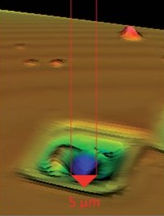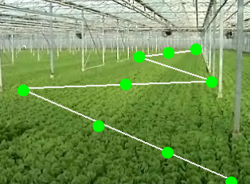Sampling Uncertainty Working Group
Terms of Reference
 The Eurachem Sampling Uncertainty Working Group operates in accordance with the Constitution agreed in the Eurachem Memorandum of Understanding.
The Eurachem Sampling Uncertainty Working Group operates in accordance with the Constitution agreed in the Eurachem Memorandum of Understanding.- The Eurachem Sampling Uncertainty Working Group will prepare guidance for the evaluation of uncertainties in measurement arising from the process of sampling. This guidance will be applicable to all chemical measurements that require the taking of a sample. It will provide guidance on the assessment of the uncertainty of the measurement that is caused by the process of sampling, and any physical preparation of the sample prior to analysis, and how this can be combined with estimates of uncertainty arising from the analytical process.
- These guides will be developed in collaboration with relevant international bodies and will be updated as experience is gained in their use.
Activities
 The UfS working group is currently working to promote the Eurachem Guide "Measurement uncertainty arising from sampling" (below) and is developing a number of information leaflets related to sampling uncertainty. The WG has also acted as the scientific committee for Eurachem workshops on sampling, and collaborates with other working groups to promote best practice in sampling. In addition, members of the group contribute to communication and debate on this subject through conferences and publications, and via contributions to consultations on regulatory documents.
The UfS working group is currently working to promote the Eurachem Guide "Measurement uncertainty arising from sampling" (below) and is developing a number of information leaflets related to sampling uncertainty. The WG has also acted as the scientific committee for Eurachem workshops on sampling, and collaborates with other working groups to promote best practice in sampling. In addition, members of the group contribute to communication and debate on this subject through conferences and publications, and via contributions to consultations on regulatory documents.
In addition, a Joint Task Group (JTG) has been set up between the Sampling Uncertainty WG and the Method Validation WG, with input from Eurolab and NMKL, to prepare Supplementary Guidance on the Validation of Measurement Procedures that Include Sampling (VaMPIS). Initial discussions within the JTG have focused on the balance between the quantitative and descriptive approach, and also between the integrated and isolated approach. A Discussion Forum, joint with Eurolab, was held online on 4th May 2022 to engage with the wider user community and attracted 450 participants.
Members
- Mike Ramsey - University of Sussex, UK & RSC AMC (Chair) (Eurachem)
- Peter Rostron - RSC AMC, UK (Secretary) (Eurachem)
- Ricardo Bettencourt da Silva -Univ Lisboa, Portugal (Eurachem & CITAC)
- Steve Ellison - LGC, UK (Eurachem)
- Nathalie Guigues - LNE, France (Eurachem)
- Achilleas Iakovakis -Aristotle University of Thessaloniki (AUTH), Greece (Eurachem)
- Perihan Ömeroğlu (Bursa Uludag University, Türkiye) (Eurachem)
- Fernando Cordeiro Raposo - Portugal (Eurachem)
- Andrea Paul - BAM, Germany (Eurachem)
- Eskil Sahlin - RISE Research Institutes of Sweden (Eurachem)
- Carlo Tiebe - BAM, Germany (Eurachem)
- Alex Williams - UK (Eurachem)
- Roger Wood - RSC AMC (UK) (Eurachem)
- Vassilis Zonaras - Department of Pesticides Control and Phytopharmacy, Greece (Eurachem)
Corresponding members
- Bertil Magnusson - Trollboken, SE (Eurachem)
- Paolo de Zorzi - APAT; Environment Agency, Italy (Eurachem)
Outputs
Publications

The second edition of the Guide added several new features, including provisions for handling the large relative uncertainty common in sampling by use of uncertainty factors, and more economical designs for sampling uncertainty studies.
The group has also published an information leaflet on the Uncertainty Factor.
Workshops
- Eurachem Workshop: Uncertainty in Sampling and Compliance (Berlin, April 2008)
- Eurachem workshop: Uncertainty from sampling and analysis for accredited laboratories (Berlin, November 2019).
Collaborative activities
The working group works closely with other groups interested in sampling, in particular the UK Royal Society of Chemistry Analytical Methods Committee (AMC). Particularly relevant outputs related to the Eurachem Sampling Uncertainty guide are the following sampling-related Technical Briefs produced by the AMC Sampling sub-committee:
- Terminology - the key to understanding analytical science. Part 2: Sampling and sample preparation (2005) Technical Brief 19 of the Analytical Methods Committee (ISSN 1757- 5958)
- Analytical and sampling strategy, fitness for purpose, and computer games (2005) Technical Brief 20 of the Analytical Methods Committee (ISSN 1757- 5958)
- Optimising your uncertainty - a case study (2008) Technical Brief 32 of the Analytical Methods Committee
- Measurement Uncertainty arising from sampling: the new Eurachem Guide (2008) Technical Brief 31 of the Analytical Methods Committee
- What is uncertainty from sampling, and why is it important? (2008) Technical Brief 16A of the Analytical Methods Committee
- The Duplicate Method for the estimation of measurement uncertainty arising from sampling (2009)Technical Brief 40 of the Analytical Methods Committee
- The importance, for regulation, of uncertainty from sampling (2009) Technical Brief 42 of the Analytical Methods Committee
- Quality Control of routine sampling in chemical analysis (2012) Technical Brief 51 of the Analytical Methods Committee
- Estimating sampling uncertainty – how many duplicate samples are needed? (2014) Technical Brief 58 of the Analytical Methods Committee
- Random samples (2014) Technical Brief 60 of the Analytical Methods Committee
- Unbalanced robust ANOVA for the estimation of measurement uncertainty at reduced cost (2014) Technical Brief 64 of the Analytical Methods Committee
- Sampling theory and sampling uncertainty (2015) Technical Brief 71 of the Analytical Methods Committee
- Representative sampling? Views from a regulator and a measurement scientist (2016) Technical Brief 73 of the Analytical Methods Committee
- Proficiency testing of sampling (2017) Technical Brief 78 of the Analytical Methods Committee
- Beam sampling: taking samples at the micro-scale (2018) Technical Brief 84 of the Analytical Methods Committee
- Why do we need the uncertainty factor? (2019) Technical Brief 88 of the Analytical Methods Committee
- The role of accreditation in ensuring sampling quality (2019) Technical Brief 90 of the Analytical Methods Committee
- What’s novel in the new Eurachem guide on uncertainty from sampling? (2019) Technical Brief 96 of the Analytical Methods Committee
- How reliable is my uncertainty estimate? (2021) Technical Brief 105 of the Analytical Methods Committee
- Comparing measurement uncertainty values (2022) Technical Brief 112 of the Analytical Methods Committee
These are all available on the RSC AMC Technical Briefs page.
Software for Uncertainty from Sampling and Validation
The RSC Analytical Methods Committee has published several versions of the robust ANOVA software (RANOVA) mentioned in Eurachem sampling uncertainty guidance, as well as the OptiMU software for finding an optimum level of measurement uncertainty. The software can be downloaded at teh link below.
Note that registration may be needed in order to access the software.

